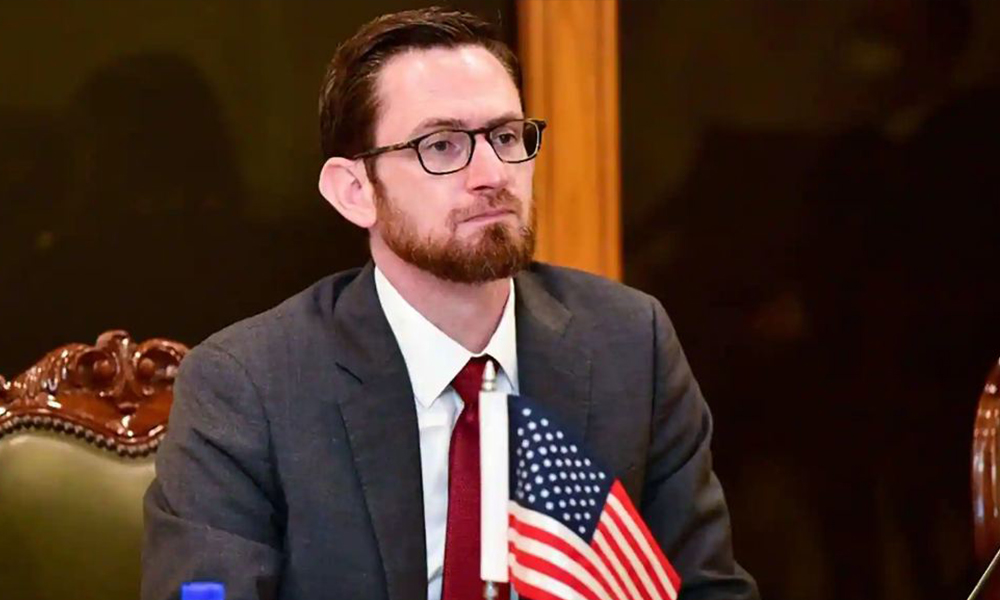Latest News
West claims IEA letter to US Congress ‘misconstrued the facts’

US Special Representative for Afghanistan Thomas West said on Friday the Islamic Emirate of Afghanistan’s (IEA) letter to Congress this week “misconstrued the facts” about the country’s economic and humanitarian crises.
In a series of tweets, West said: “The Taliban’s (IEA) letter to Congress earlier this week misconstrued the facts re Afghanistan’s economic & humanitarian crisis. Afghanistan was unfortunately already suffering a terrible humanitarian crisis before mid-August, made worse by war, years of drought, & the pandemic.”
This comes after Afghanistan’s acting foreign minister Mawlawi Amir Khan Muttaqi warned Wednesday that continued “sanctions” will not help the current situation and could instead lead to a major crisis including a mass migration.
In a letter addressed to the United States Congress, Muttaqi said after suffering decades of war, the Afghan people now “have a right to financial security.”
“Currently the fundamental challenge of our people is financial security and the roots of this concern lead back to the freezing of assets of our people by the American government,” he said.
He also said that following the signing of the Doha Agreement in February last year, the Islamic Emirate of Afghanistan (IEA) “no longer find ourselves in direct conflict with one another nor are we a military opposition, what logic could possibly exist behind the freezing of our assets?”
However, West said on Friday that “U.S. officials made clear to the Taliban (IEA) for years that if they pursued a military takeover rather than a negotiated settlement with fellow Afghans…then critical non-humanitarian aid provided by the international community – in an economy enormously dependent on aid, including for basic services – would all but cease. That is what occurred.”
He said the U.S. would “continue clear-eyed, candid diplomacy with the Taliban (IEA). Legitimacy and support must be earned by actions to address terrorism, establish an inclusive government, and respect the rights of minorities, women and girls – including equal access to education and employment.”
West also stated that the U.S. will continue to support the Afghan people with humanitarian aid. “We’ve provided $474 million this year, applaud the robust efforts of Allies and partners in this space, and are making every effort to help the UN and humanitarian actors scale up to meet needs this winter,” he said.
Latest News
Girls’ education is a ‘vital issue’ for Afghanistan: Karzai

Former president Hamid Karzai said in a meeting with Iran’s ambassador and special representative, Hassan Kazemi Qomi, that education of girls was a “vital issue” for Afghanistan.
Karzai said he appreciated Iran’s cooperation and its standing with the Afghan people, especially Iran’s contributions to education in Afghanistan.
During the meeting, Karzai said peace and stability in the region are in the interest of all regional countries.
Latest News
Uzbekistan’s humanitarian aid arrives in Balkh

A shipment of humanitarian aid from Uzbekistan was handed over on Thursday to the local officials of Balkh province in the trade port of Hairatan.
Local authorities said the aid, which includes flour, oil, wheat, sugar and meat, has been handed over by Uzbekistan’s Surkhandarya governor to the governor of Balkh.
The governor of Surkhandarya stated the purpose of sending this aid was to support the people of Afghanistan and stressed the need for the development of good relations between the two countries.
Latest News
Afghanistan’s problems caused more damage to Pakistan than 3 wars with India: Durrani

Islamabad’s special envoy for Afghanistan Asif Durrani said on Wednesday that Pakistan has suffered more due to Afghanistan’s internal situation than Pakistan has suffered in three wars with India in terms of blood spilt and finances drained.
Durrani said at a one-day International Conference titled “Pakistan in the Emerging Geopolitical Landscape”, which was organized by the Institute of Strategic Studies Islamabad (ISSI) and the German Friedrich Ebert Stiftung (FES), that over 80,000 Pakistanis died in the two decades of the War on Terror and that his country was still counting its dead and injured.
“After the withdrawal of NATO forces, it was hoped that peace in Afghanistan would bring peace to the region. However, such expectations were short-lived,” he said.
He also stated that attacks by the Tehreek-e-Taliban Pakistan (TTP) militant group on Pakistan’s border areas increased by 65 percent, while suicide attacks increased by 500 percent.
“The TTP’s enhanced attacks on Pakistan while using Afghan soil have been a serious concern for Pakistan. Another worrying aspect is the participation of Afghan nationals in these attacks,” he said.
Durrani also said Pakistan had suffered geopolitically since the Soviet Union invaded the neighboring country.
“The post-9/11 world order has negatively impacted Pakistan. Apart from losing 80,000 citizens’ lives, including 8,000 law enforcement agency personnel, the country’s economic opportunity cost is estimated at $150 billion,” Durrani said.
Talking about the future outlook for Pakistan in the regional context, Durrani said that while “our eastern neighbor is likely to continue with its anti-Pakistan pursuits, the western border poses an avoidable irritant in the short to medium term.”
However, he said Pakistan can overcome its difficulties with Afghanistan, including the TTP challenge.
-

 Latest News5 days ago
Latest News5 days agoPakistan’s frontiers minister stresses ‘dignified’ return of Afghan refugees
-

 Latest News3 days ago
Latest News3 days agoRashid Khan named AWCC’s brand ambassador
-

 Regional3 days ago
Regional3 days agoIranian president lands in Pakistan for three-day visit to mend ties
-

 Climate Change4 days ago
Climate Change4 days agoMassive river flooding expected in China, threatening millions
-

 Latest News5 days ago
Latest News5 days agoChinese keen to invest in Panjshir-Kabul water conduit project
-

 World5 days ago
World5 days agoTwo Japan navy helicopters crash, one body found, 7 missing
-

 Sport4 days ago
Sport4 days agoKolkata beat Bengaluru by one run in IPL as Kohli fumes at dismissal
-

 Sport4 days ago
Sport4 days agoACL: Aino Mina 3-0 Istiqlal Kabul; Attack Energy 3-0 Khadim
























